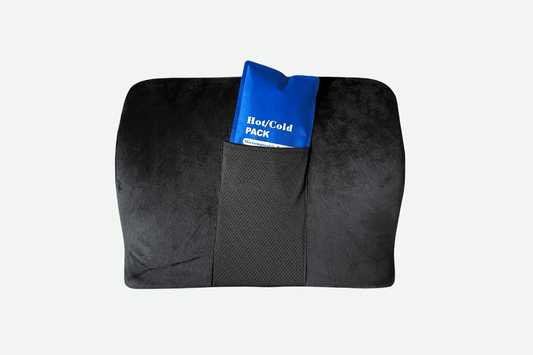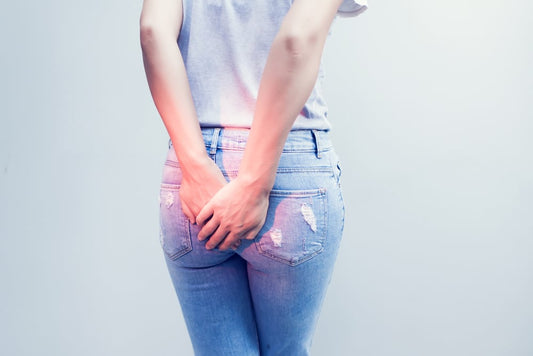What Triggers Hemorrhoids? 5 Foods to Avoid With Hemorrhoids
Robert Cutler, D.O., FAOCPrShare
Let’s face it—hemorrhoids are the unwelcome houseguests of the digestive system. They show up unannounced, make themselves at home, and refuse to leave without causing some serious discomfort. If you’ve ever dealt with the itching, burning, or downright unpleasant pain of hemorrhoids, you know exactly what we’re talking about.
While a number of factors contribute to these pesky flare-ups—like prolonged sitting, straining on the toilet, or simply the cruel humor of the universe—one of the biggest culprits is diet. Yes, that hot sauce-laden burrito or those extra-cheesy nachos could be plotting against you. Change is hard, but doable.
Let’s take a closer look at some of the foods that can trigger hemorrhoids and why eliminating them from your diet and moving towards a diet for hemorrhoid sufferers is a smart move.
The Science Behind Hemorrhoids and Dietary Triggers
Hemorrhoids or piles are swollen veins in the rectal area that can be internal or external. They often develop due to excessive pressure in the lower rectum, caused by straining, chronic constipation, or prolonged sitting. One of the biggest contributors to hemorrhoids is diet—specifically, consuming foods that irritate the digestive tract, cause inflammation, or lead to constipation.
Certain foods can exacerbate hemorrhoid symptoms by irritating the intestinal lining, slowing digestion, or contributing to hard stools that make bowel movements more painful. By identifying and avoiding foods that trigger hemorrhoids, you can minimize flare-ups and support overall gut health.
5 Foods to Avoid with Hemorrhoids
When managing hemorrhoids, it’s essential to eliminate foods that contribute to irritation, inflammation, and digestive distress. Here are the top five foods to avoid to keep hemorrhoid symptoms in check.
1. Processed Foods

Processed foods are notorious for their low fiber content, which can contribute to constipation—a leading cause of hemorrhoids. Many packaged snacks, frozen meals, and fast foods lack essential nutrients and fiber, making it difficult for your digestive system to function smoothly.
Why Processed Foods Are a Problem:
- Lack of fiber slows down digestion, leading to constipation and straining.
- High sodium content can cause dehydration, making stools harder.
- Artificial additives may irritate the gut and contribute to inflammation.
Better Alternatives: Swap out processed foods for whole grains, fresh fruits, and vegetables. A fiber-rich piles diet promotes healthy digestion and regular stool.
2. Spicy and High-Fat Foods

Spicy foods, while delicious, can aggravate hemorrhoids by irritating the digestive tract and increasing inflammation. High-fat foods, such as fried foods and greasy meals, can slow digestion and lead to constipation.
Why Spicy and High-Fat Foods Are a Problem:
- Spicy foods can increase rectal burning and irritation.
- Greasy, fried foods can contribute to constipation and hard stools.
- High-fat meals slow digestion and make bowel movements more difficult.
Better Alternatives: Opt for mild seasonings, lean proteins, and moderate amounts of healthy fats like avocado, nuts, and olive oil.
3. Dairy Products

Dairy can be problematic for individuals who are lactose intolerant or have sensitive digestive systems. Milk, cheese, and other dairy products can contribute to bloating, gas, and constipation.
Why Dairy Is a Problem:
- Dairy can slow digestion and contribute to constipation.
- Some people experience bloating and discomfort after consuming dairy.
- Hard cheeses are particularly binding and may worsen hemorrhoid symptoms.
Better Alternatives: Try any plant-based dairy alternative products to reduce irritation. Almond, Oat, Rice, and Rice are all great!
4. Nuts, Seeds, Corn, and Popcorn

While nuts and seeds are packed with nutrients, their rough texture can be problematic for smooth intestinal passage. These foods can scrape against inflamed hemorrhoids during bowel movements, increasing discomfort and prolonging healing.
Why These Foods Are a Problem:
- Hard, undigested particles can irritate hemorrhoids as they pass through.
- They may contribute to painful bowel movements and prolonged healing time.
- Corn and popcorn have sharp edges that can cause further irritation.
Better Alternatives: Opt for nut or seed butter for a smoother digestive experience.
5. Pickled Foods, Onions, and Garlic

Pickled foods, onions, and garlic can contribute to inflammation and irritation in the digestive tract. These foods often contain high amounts of sodium, which can lead to dehydration and constipation.
Why These Foods Are a Problem:
- High sodium content can contribute to dehydration and harder stools.
- Pickled foods can increase inflammation in the digestive tract.
- Onions and garlic may cause digestive discomfort and bloating.
Better Alternatives: Choose fresh vegetables and herbs to season your meals without irritating your system.
The Link Between Diet and Hemorrhoids
It is important to consider the entire digestive process even when addressing symptoms occurring only in one spot. That’s why what you eat is so important. Avoiding foods that trigger hemorrhoid symptoms is essential for long-term relief. Processed foods, high-fat items, and inflammatory ingredients can all contribute to flare-ups. By eliminating these foods and making smarter dietary choices, you can significantly reduce discomfort and support a healthy digestive system.
Dietary Changes for Hemorrhoid Management
Making strategic dietary changes can be a game-changer when it comes to preventing and managing hemorrhoids. Here are some effective generalized dietary shifts to consider:
Increasing Fiber Intake
- Fiber softens stools and makes bowel movements easier, reducing the need for straining.
- A high-fiber diet includes whole-grain cereals, bran, fruits, and vegetables.
- Psyllium husk supplements can also help bulk up stool consistency.
Choosing Whole Foods
- Whole foods are nutrient-dense and promote better digestion.
- Fresh fruits, vegetables, and whole grains support gut health.
- Avoid processed snacks and opt for homemade meals.
Staying Hydrated
- Drinking 6-8 glasses of water daily keeps stools soft and prevents constipation.
- Herbal teas and water-rich fruits like watermelon and cucumber can help maintain hydration levels.
- BUT WHAT ABOUT COFFEE?? Coffee, unfortunately, can be a hemorrhoid trigger and cause dehydration. If you drink a lot of it, try to scale back your intake.
Changing Your Diet to Prevent Hemorrhoids
If you’re prone to hemorrhoids, making dietary changes can be one of the most effective ways to prevent flare-ups. Avoiding the 5 foods listed above and in general, foods that trigger inflammation and digestive distress while increasing fiber and hydration can be the key to less discomfort and a boon to overall health.
The good news? You don’t have to overhaul your entire life overnight. Small, manageable adjustments to your diet can make a world of difference. Also, maintaining a good attitude is half the battle. So, grab a comfy seat (preferably a cushioned one), and go through each of the five food categories above and note down one change you can make in each, and keep it fun. Try, for example, to make a hamburger at home instead of buying one from nearby fast food.
We get it—change is tough. No one wants to part ways with their favorite comfort foods, especially when they bring a little joy after a long day. But your body will thank you for making smarter choices and soon enough, those small tweaks will become second nature. Think of it as a trade-off: less discomfort, more peace of mind.
The secret to success lies in balance. You don’t have to cut out everything you love, just the troublemaker wreaking havoc on your digestive system. By being mindful of what goes on your plate, you’re giving yourself the best chance at preventing flare-ups and keeping things running smoothly. And hey, if nothing else, you’ll have some great new food discoveries along the way!
Understanding which foods to avoid can help prevent discomfort and reduce the risk of exacerbating hemorrhoid symptoms. By making mindful dietary changes, you can take a proactive approach to your digestive health and keep flare-ups at bay. By consistently making these mindful food choices, you can create better habits leading to better digestion and reduced risk of hemorrhoid flare-ups. If you’re struggling with persistent symptoms, consider incorporating Doctor Butler’s ointment into your daily routine and consulting a healthcare professional for further guidance. Small dietary changes can lead to big relief—your digestive health will thank you! Check out Doctor Butler’s hemorrhoid products and start your journey toward hemorrhoid relief today!


